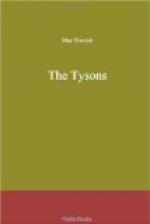They were curious documents. One was a letter to his wife, imploring her forgiveness. “And yet,” he had written, “except for one sin (committed when I was to all intents and purposes insane), and for one mistake, the grossest man ever made, you have nothing to forgive. I swear that I loved you even then; and I shall always love you, as I have never loved—never could love—any other woman. Believe me, I don’t say this to justify myself. There would be far more excuse for me if I had been simply incapable of the feeling. As it is, I sinned against the highest, the best part of myself, as much as against you.” There was more in the same strain, only less coherent; hurried sentences jotted down in the night, whenever he could snatch a minute from his duty. He must have meant every word of it at the moment of writing; and yet—this is the curious thing—it was in flat contradiction to certain statements made in the other paper.
This was a long letter to Stanistreet, begun in the form of an irregular diary—a rough account of the march, of the fighting, of the struggle with dysentery, given in the fewest and plainest words possible, with hardly a trace of the writer’s natural egotism. The two last sheets were a postscript. They had evidently been written at one short sitting, in sentences that ran into each other, as if the writer had been in passionate haste to deliver himself of all he had to say. The first sentence was a brief self-accusation, what followed was the defense—a sinner’s apologia pro vita sua. He had behaved like a scoundrel to his wife. To other women too, if you like, but it had been fair fighting with them, brute against beast, an even match. While she—she was not a woman; she was an adorable mixture—two parts child to one part angel. And he, Tyson, had never been an angel, and it was a long time since he had been a child. That accounted for everything. Barring his marriage, none of his crimes had been committed in cold blood; but he had gone into that with his eyes open, knowing himself to be incapable of the feeling women call love. (Of course, there was always the other thing.) But that love of his wife’s was something divine—a thing to believe in, not to see. Men were not made to mate with divinities. He ought to have fallen down and worshiped the little thing, not married her. But was it his fault!
That particular crime would never have been committed if he had been left to himself. It was not the will of God; it was that will of the old man Tyson. The whole thing was a cursed handicap from beginning to end. He was strong; but the world and life and destiny were a bit stronger—it was three to one, and two out of the three were women—see? It’s always two to one on them. You can’t hit out straight from the shoulder when you fight with women, Stanny. If you can keep ’em going, it’s about all. He had nothing to say against Destiny, mind. Destiny fights fair enough (for a woman), and she had fought fair with him. She had picked him up out of the dirt when the scrimmage was hottest, and pitched him into the desert to die. It was better to die out here in the desert cleanly, than to die in the gutter at home. If only he could die fighting!




